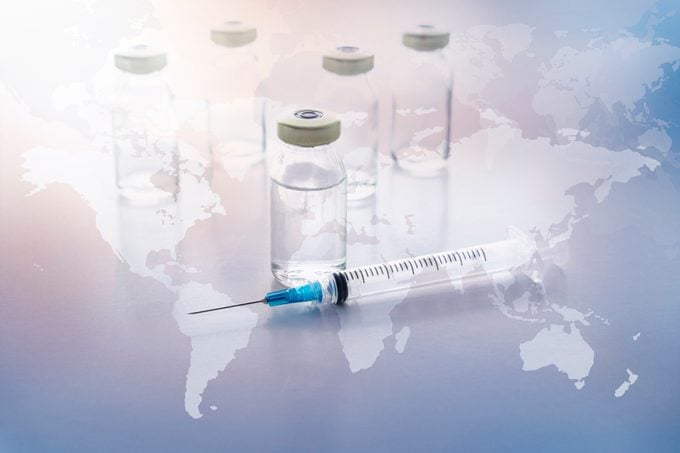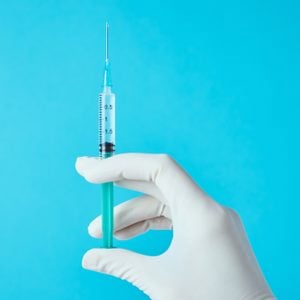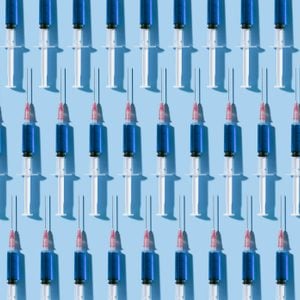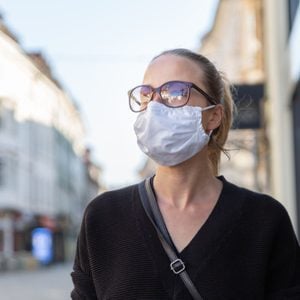Here’s When the New Covid-19 Vaccine Will Most Likely Reach You
Updated: Mar. 30, 2022
The first Covid-19 vaccine is closer to launch, but how long it will take until you get it may vary. Here's what experts want you to know about the new vaccine and when it might be available.
A new Covid-19 vaccine
The world responded with wild excitement when pharmaceutical giant Pfizer recently announced that its investigational Covid-19 vaccine was 90 percent effective at preventing the disease in a clinical trial. And there’s plenty of reason to be enthused.
Any vaccine this potent has the potential to virtually wipe out a disease if enough people get it. (Here’s what it’s like to be part of a Covid-19 vaccine trial.)
That said, there are reasons to temper the enthusiasm. As more data flow in, the vaccine’s effectiveness will likely diminish, says H. Dirk Sostman, MD, president of the Houston Methodist Academic Institute.
We also don’t know how effective the vaccine will be in people 65 and over. Nor do we know how long immunity will last, among other questions.
However, it certainly looks like we will have a vaccine for Covid-19. (In fact, we’ll likely have several, with Moderna posed to announce efficacy data on its vaccine candidate by the end of November.) But how soon will you be able to get the new Covid-19 vaccine and will it really return us to “normal”?
A new type of vaccine
The Pfizer vaccine, developed in collaboration with German company BioNTech, is an entirely new type of vaccine. It’s one of several different promising vaccines currently under development.
It uses messenger RNA (mRNA) to teach cells how to make an exact replica of the spike protein on the surface of SARS-Cov-2, the virus that causes Covid-19. The body then produces antibodies that can neutralize the real virus if it ever encounters it.
Scientists determined that the vaccine—called BNT162b2—is 90 percent effective from ongoing Phase 3 clinical trials involving 45,538 study participants, all of whom had received two doses.
At the time, 94 of the volunteers had confirmed Covid-19. No one knows how many of these positive cases actually received the vaccine. But Dr. Sostman says it’s safe to assume that most were in the placebo arm (a vaccine designed to have no therapeutic benefit).
The trial will keep going until there are 164 confirmed cases. At that point, investigators will recalculate the numbers and apply to the Food and Drug Administration (FDA) for Emergency Use Authorization.
Is the new Covid-19 vaccine safe?
So far, Pfizer’s BNT162b2 vaccine appears to be safe. As with all vaccines and treatments, though, officials will continue to collect safety data as long as the vaccine is in use.
Pfizer and BioNTech predict they’ll have enough safety data to satisfy FDA approval requirements by the end of November.
“There have been no severe adverse reactions,” says Dr. Sostman. In fact, he adds, there have been very few problems in some 200,000 people participating in trials for Covid-19 vaccines worldwide.
“If a vaccine has undergone the scientific process and level of rigor required to pass an FDA standard, as a physician I would trust the vaccine to give it to myself and also to my family,” says Jay W. Lee, MD, a family physician in Orange County, California.
Side effects
But “safe” does not necessarily mean there are no side effects. In fact, this vaccine is what William Schaffner, MD, an infectious diseases specialist at Vanderbilt University Medical Center in Nashville, calls a “reactogenic” or “ouch” vaccine.
That means it’s likely to give you a sore arm for a couple of days and some people may feel “crummy [with] a headache [and] maybe even a degree of fever,” he says. The shingles vaccine, which also comes in two doses, affects some people in a similar way.
How long will immunity last?
No one knows how long any immunity conferred by the vaccine will last, or whether a Covid-19 vaccine will become like the flu vaccine with a new one needed every year.
As Dr. Lee points out, we still have questions about “natural immunity,” which is how long you’re protected after actually being sick. There have been reports of people who’ve gotten SARS-CoV-2, coronavirus reinfection.
Right now, the evidence suggests that SARS-CoV-2 is not mutating as fast as the flu virus does, which makes it less likely the vaccine will need to be updated every year.
“So far, the essential part of this virus—the part that the vaccine works against [the spike protein]—has been really stable genetically,” says Dr. Schaffner. “We’re guardedly optimistic that for the reasons of virus change we won’t have to get revaccinated [although] we may have to get revaccinated because the protection given by the vaccine may wane over time.”
We don’t know if that will be true or for how long.
Getting regulatory approval
The FDA has to approve all vaccines (and treatments and medical devices) before they go to market and are available to the general public.
Given the dire straits Covid-19 has placed us in—daily cases in the U.S. recently reached a record high of 145,000—the FDA is prepared to act fast, really fast. In fact, the agency has been doing so since Covid-19 first arrived.
What happens next?
Most likely, Pfizer will submit its next round of results to the FDA in a matter of weeks. The FDA will consult with its external advisory committee and hold an open meeting (virtually) with the public to solicit feedback.
“We will be able to get a very clear look at the actual data, says Dr. Schaffner. “We are guardedly optimistic that we will be reassured and then the first vaccine programs will start probably sometime in the second half of December. I would think no later than the beginning of next year.”
Manufacturing the vaccine
Developing a vaccine that seems effective is just the beginning. Then you need to produce it and get it out to people. Conventional vaccines like the ones for influenza can take months to ramp up. But mRNA technology is comparatively rapid. And companies have given themselves a leg up by starting production even before the vaccines were FDA approved. That means we already have a supply ready and waiting.
Pfizer and BioNTech predict that they’ll be able to produce up to 100 million doses by the end of 2020 and up to 1.3 billion doses in 2021. “[Pfizer and BioNTech] apparently have been producing steadily,” says Dr. Sostman.
Glass vials
The vaccine itself is the most important ingredient, of course. But many other things are needed to roll out the product. Like, for instance, the glass vials that hold the vaccine. Hundreds of millions of these will be needed.
“They’re made of a special kind of borosilicate glass that’s very pure,” says Dr. Sostman. “Nothing leaches out of the glass into the vaccine. It doesn’t absorb the vaccine.” Only a couple of companies in the world make this type of glass.
Earlier in the year, experts were worried about a shortage, but companies have since sped up Covid-19 vaccine production to meet the expected need, according to Chemical & Engineering News.

Transportation and distribution of the vaccine
One of the biggest challenges in getting the vaccine out there is the fact that it needs to be refrigerated at around minus 94 degrees Fahrenheit, says Dr. Schaffner.
“This Pfizer vaccine is very different from other vaccines,” he explains. “It’s fragile and so it has to be kept very, very cold. Once you take a vial out, the vaccine has to be used rather promptly otherwise it becomes less potent.”
It’s not likely the vaccine will be available at local pharmacies or doctor’s offices. One of the things Tennessee officials are considering are special refrigerator-freezer trucks with a team that can go out and vaccinate people, he says.
Who gets the Covid-19 vaccine first?
Officials haven’t ironed out the details of this (in fact, it’s not entirely clear who’s in charge of the details), but it looks like healthcare workers and first responders will be a priority, says Dr. Schaffner.
They may even start receiving the vaccine by the end of 2020 or probably no later than the beginning of 2021, he adds. Other groups will get it later, possibly in the immediate ensuing months (February and March). No one knows how much the vaccine will cost, but one news outlet reports that it will be priced below “typical market rates.”
Exact amounts would likely differ depending on the region. (Learn how some people are getting leftover Covid-19 vaccines.)
Will a vaccine get us back to “normal”?
Of course, this is the question everybody is asking and no one has a clear answer to. Getting back to normal will take a lot of time and, let’s face it, may never completely happen.
“Even in the U.S., this is obviously a process that’s going to take months,” says Dr. Schaffner. “Lots of people will hold back. They won’t get in line and roll up their sleeves right away.” Plus, the vaccine (or any vaccine, for that matter) won’t provide 100 percent protection.
And even after the vaccine is available, we’re probably still going to social distance and wear face masks and there’s more reason than ever to cover your face.
The Centers for Disease Control and Prevention now says masks protect the wearer as well as the people around him or her. According to a study in Aerosol Science and Technology, cloth masks may reduce transmission by as much as 77 percent.
Maybe one year from now
“I would hope if everything goes well, next Thanksgiving will be near normal but I’m always cautious,” says Dr. Schaffner. “This is a marathon, not a sprint and the virus—unlike what you may have heard—is not just going to disappear.”
In the meantime, set your sights on a coming attraction: a vaccine that may be more effective than anyone anticipated.
“Getting vaccinated is a very selfless act of prevention that protects not only yourself but those you care about,” says Dr. Lee. “We all play a role.” The more people who are vaccinated, the better off we will be.



